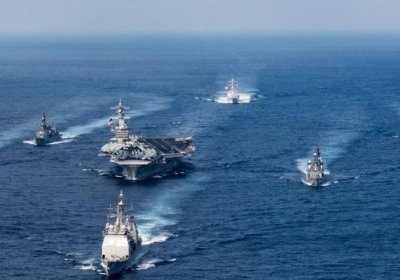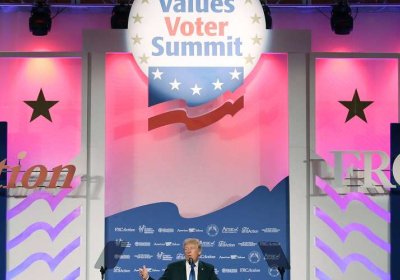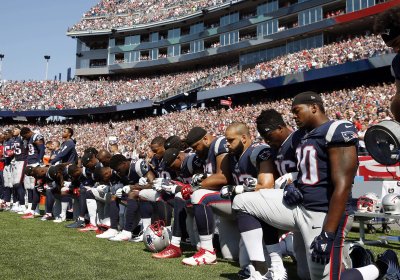It is important to understand the context and the intended (as well as likely) effects of the US administration's actions. With encouragement from Florida Senator Marco Rubio and other Republicans, US President Donald Trump has been trying to help topple the elected government of Venezuela.
Donald Trump
Writing in the October 28 New York Times, conservative columnist David Brooks said the preceding week was “when Donald Trump and Steve Bannon solidified their grip on the Republican Party and America’s national government”.
Brooks speaks for the Republican establishment — and sorely deplores this development.
It is an understatement to say that relations between the US and North Korea are very tense.
The US government continues to threaten to further tighten economic sanctions on North Korea, and launch a military attack to destroy the country’s missiles and nuclear weapons infrastructure. For its part, the North says it will respond to any attack with its own strikes against US bases in the region and even the US itself.
The United Socialist Party of Venezuela’s (PSUV) victory in the October 15 elections for state governors is a major blow to the country’s right-wing opposition, as well as to its backers in Washington and Europe.
The victory also marks a significant step forward in the struggle to defend the gains of the almost two decade-long pro-poor Bolivarian Revolution, spearheaded by late former President Hugo Chavez.
Advocates of LGBT rights and religious freedom denounced President Donald Trump as he became the first sitting president to address the Values Voter Summit on October 13.
In his speech, Trump assured his supporters that “Judeo-Christian religious values” would be protected by his administration.
The Southern Poverty Law Center, which classifies the Family Research Council (FRC), one of the groups behind the summit, as a hate group, tweeted that “speaking to anti-Muslim, anti-LGBT groups, Pres. Trump says he is proud to be among so many friends”.
As the Nobel Committee announced on October 6 in Oslo that the International Campaign to Abolish Nuclear Weapons had won the Nobel Peace Prize. At the same time, US President Donald Trump is expected to “decertify” the landmark 2015 Iran nuclear deal next week. Democracy Now! spoke with Tim Wright, the Asia-Pacific director of the International Campaign to Abolish Nuclear Weapons. The full transcript follows the video.
Prime Minister Malcolm Turnbull and his business mates have wasted no time in coat-tailing US President Donald Trump and renewing their threat to cut the company tax rate.
Trump announced a plan on September 27 to slash the US corporate tax rate from 35% to 20%, at an estimated cost to the national budget of US$2 trillion over 10 years. He did not give any details, but it will be a massive public hand-out to big business. Meanwhile, Trump and the Republicans continue to seek to undermine health insurance for the poor.
Puerto Rico is facing a huge humanitarian crisis after being hit by two super-strong hurricanes. It suffered a glancing blow by Irma and then a direct hit by Maria, both storms greatly strengthened by warmer ocean water caused by climate change.
The crisis is still unfolding weeks after Maria hit. The full picture and extent of the damage will not be known for some time.
One year ago, Colin Kaepernick, then-quarterback for the San Francisco 49ers National Football League team, refused to stand for the US national anthem, famously kneeling instead. He was alone in his protest.
Over the weekend of September 23-24, tens of millions of football fans watched on TV as 200 mostly Black players knelt or raised their fists while the national anthem was sung. The rest of their teams stood in solidarity with their right to protest, arm-in-arm. In some cases, entire teams stayed in the locker room while the anthem played.
US President Donald Trump made the unprecedented threat to “totally destroy” North Korea, not in a tweet or off the cuff remark, but in a written speech before the United Nations General Assembly on September 20. No other leader of a country has ever stood before the UN and openly stated its intention to destroy another country.
Coupled with Trump’s earlier threat to rain down “fire and fury” on North Korea, this threat must be seen as one that at least includes the possibility of a nuclear attack.
With the Venezuelan right-wing opposition in disarray after failing to overthrow President Nicolas Maduro through violent protest, and divided in the face of the upcoming October 15 regional elections, the frontline of the battle for Venezuela’s future has shifted outside its borders.
“The US is doing the same thing as it did with the economic blockade on Cuba, to try and suffocate the Venezuelan economy” explained Williams Camacaro, a long-time Venezuelan grassroots activist based in New York.
Speaking to Green Left Weekly in Caracas, Camacaro said “The sanctions will cause a lot of difficulties for Venezuela”, but “the reality is that a lot of time has passed since [the blockade was first imposed on Cuba]. Many things have changed.”
- Previous page
- Page 12
- Next page











